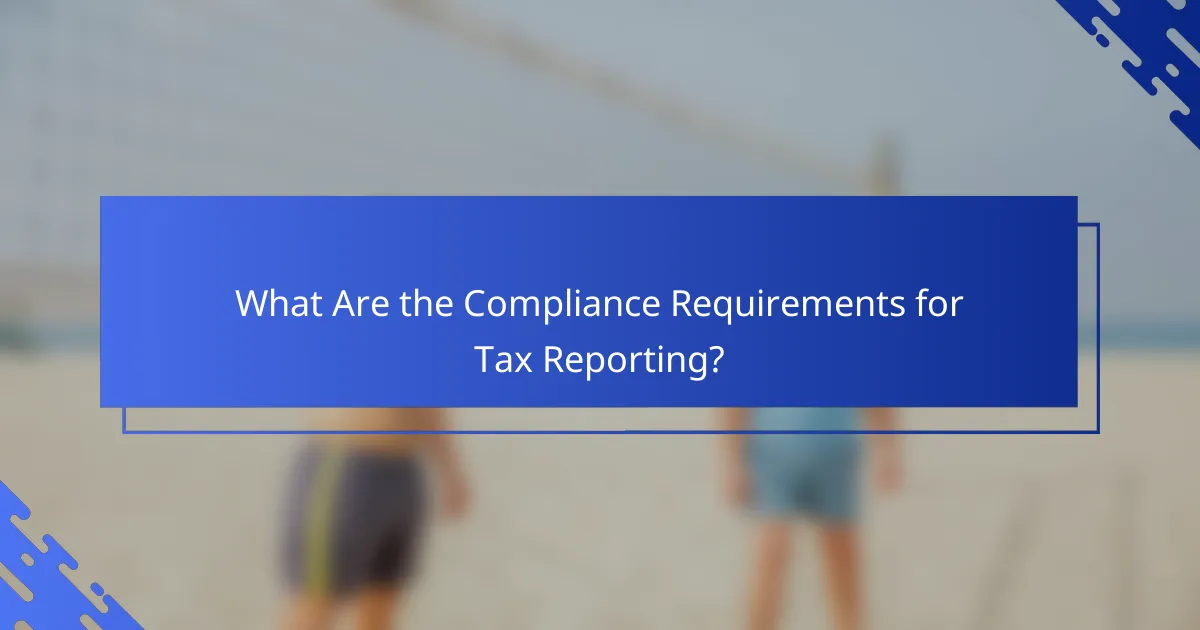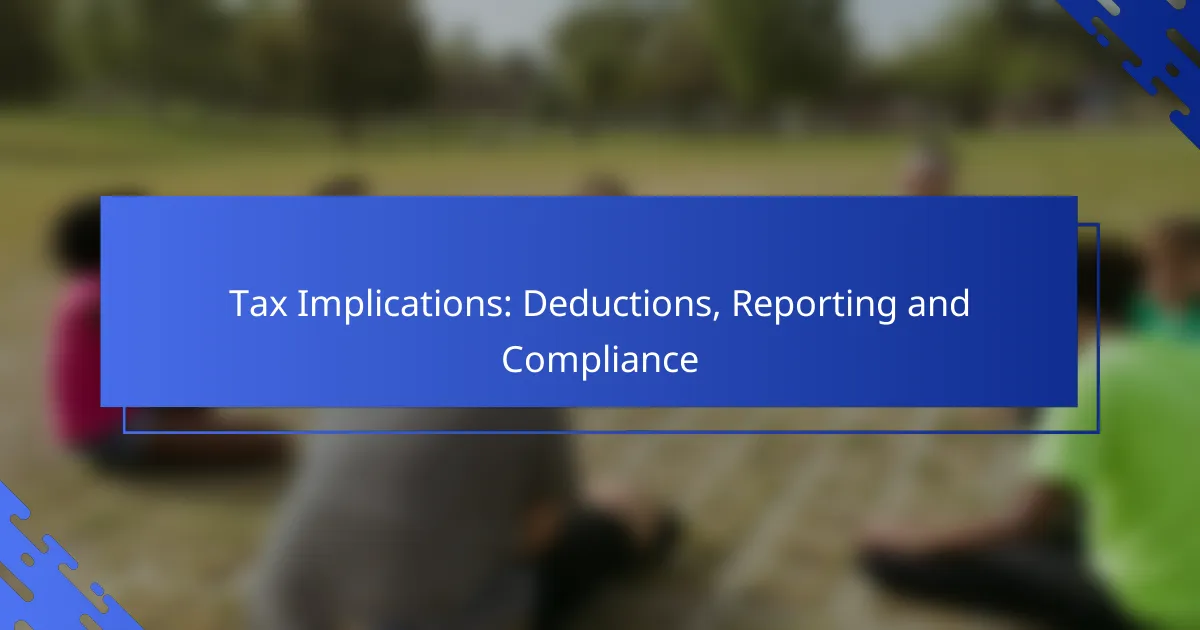Understanding tax implications, including deductions, reporting, and compliance, is vital for effective financial management. Key deductions can lower taxable income, while proper reporting ensures adherence to regulations and maximizes savings. By maintaining accurate documentation and meeting filing deadlines, individuals and businesses can navigate the complexities of tax obligations and avoid potential penalties.

What Are the Key Tax Deductions for Individuals?
Key tax deductions for individuals can significantly reduce taxable income, resulting in lower tax liability. Understanding these deductions is essential for effective tax planning and compliance.
Standard deduction
The standard deduction is a fixed dollar amount that reduces the income on which you are taxed. For the tax year 2023, the standard deduction is $13,850 for single filers and $27,700 for married couples filing jointly. Choosing the standard deduction simplifies the filing process, as it does not require itemizing individual expenses.
Itemized deductions
Itemized deductions allow taxpayers to deduct specific expenses instead of taking the standard deduction. Common itemized deductions include medical expenses, state and local taxes, and mortgage interest. Taxpayers should itemize if their total deductions exceed the standard deduction amount, as this can lead to greater tax savings.
Charitable contributions
Donations to qualified charitable organizations can be deducted from taxable income, provided you itemize your deductions. For cash contributions, you can generally deduct up to 60% of your adjusted gross income (AGI), while donations of property may have different limits. Keep receipts and records of donations to substantiate your claims during tax filing.
Mortgage interest deduction
The mortgage interest deduction allows homeowners to deduct interest paid on loans secured by their primary residence or a second home. For mortgages taken out after December 15, 2017, you can deduct interest on up to $750,000 of mortgage debt. This deduction can significantly reduce taxable income for many homeowners.
Medical expenses deduction
Medical expenses that exceed 7.5% of your AGI can be deducted if you itemize your deductions. Eligible expenses include payments for medical care, prescriptions, and certain long-term care services. Keep detailed records of all medical expenses to ensure you can claim the maximum deduction possible.

How to Report Tax Deductions Effectively?
To report tax deductions effectively, it is essential to understand the forms required, maintain proper documentation, and adhere to filing deadlines. This ensures compliance with tax regulations and maximizes potential savings.
Using IRS Form 1040
IRS Form 1040 is the primary form used by individuals to report their annual income and claim deductions. To report deductions, taxpayers typically use Schedule A, which is attached to Form 1040, allowing them to itemize deductions such as mortgage interest, medical expenses, and charitable contributions.
When filling out Form 1040, ensure that all relevant deductions are accurately reported to avoid issues with the IRS. For many taxpayers, itemizing may provide greater tax savings compared to taking the standard deduction, which is a fixed amount based on filing status.
Documentation requirements
Maintaining proper documentation is crucial for substantiating tax deductions. Taxpayers should keep receipts, invoices, and bank statements that support each deduction claimed. For example, if claiming medical expenses, retain bills and payment confirmations.
Additionally, it is advisable to organize these documents chronologically or by category to facilitate easy access when preparing your tax return. The IRS recommends keeping records for at least three years after the filing date in case of an audit.
Filing deadlines
Filing deadlines for tax returns are typically set for April 15 each year, though this may vary slightly depending on weekends or holidays. If you are unable to file by this date, you can request an extension, which usually grants an additional six months.
However, it is important to note that an extension to file does not extend the deadline for any taxes owed. Therefore, ensure that any estimated taxes are paid by the original deadline to avoid penalties and interest. Consider setting reminders well in advance to stay compliant with these deadlines.

What Are the Compliance Requirements for Tax Reporting?
Tax reporting compliance requires individuals and businesses to accurately report their income, deductions, and tax liabilities according to federal and state regulations. Understanding these requirements is crucial to avoid penalties and ensure proper tax management.
Understanding IRS regulations
The Internal Revenue Service (IRS) mandates that taxpayers file annual returns, reporting all income and claiming eligible deductions. Key forms include the 1040 for individuals and the 1120 for corporations. It’s essential to keep records of income, expenses, and supporting documents for at least three years in case of an audit.
Taxpayers should be aware of deadlines, typically April 15 for individuals, and the importance of estimated tax payments if they expect to owe tax. Failure to comply can result in penalties, interest, and potential legal issues.
State-specific compliance
Each state has its own tax laws and reporting requirements, which can differ significantly from federal regulations. For instance, some states impose income taxes while others do not. It’s crucial to check with your state’s tax authority for specific forms, deadlines, and rates applicable to your situation.
Many states also require businesses to collect sales tax, which involves additional compliance steps. Understanding local regulations can help avoid costly mistakes and ensure that all taxes owed are accurately reported and paid.
Common compliance pitfalls
One common pitfall is failing to report all sources of income, which can lead to discrepancies and audits. Taxpayers should ensure they include income from side jobs, freelance work, and investment earnings. Another frequent issue is neglecting to keep adequate records, which can complicate the filing process and hinder claims for deductions.
Additionally, many taxpayers overlook state-specific requirements or miss deadlines, resulting in late fees or penalties. To mitigate these risks, consider creating a checklist of all necessary documents and deadlines for both federal and state filings.

What Are the Tax Implications of Freelancing?
Freelancing has specific tax implications that differ from traditional employment, primarily involving self-employment tax, deductions, and estimated tax payments. Understanding these aspects is crucial for effective financial management and compliance with tax regulations.
Self-employment tax
Freelancers are responsible for paying self-employment tax, which covers Social Security and Medicare contributions. This tax rate is typically around 15.3% on net earnings, which includes both the employee and employer portions of these taxes.
To calculate your self-employment tax, determine your net earnings from freelancing, which is your total income minus any business expenses. Keep in mind that you can deduct half of your self-employment tax when calculating your adjusted gross income, which can help reduce your overall tax burden.
Deductions for freelancers
Freelancers can take advantage of various deductions to lower their taxable income. Common deductions include home office expenses, equipment costs, software subscriptions, and travel expenses related to business activities.
It’s essential to keep accurate records of all expenses and receipts to substantiate your claims. For example, if you work from home, you can deduct a portion of your rent or mortgage interest based on the size of your home office compared to your total living space.
Estimated tax payments
Freelancers are generally required to make estimated tax payments quarterly to cover their income and self-employment taxes. These payments are typically due in April, June, September, and January of the following year.
To estimate your tax payments, calculate your expected annual income and apply the appropriate tax rates. A common rule of thumb is to set aside about 25-30% of your income for taxes, but this can vary based on your specific situation and deductions. Failing to make these payments can result in penalties and interest charges, so staying on top of your tax obligations is vital.

How Do Tax Laws Affect Small Businesses?
Tax laws significantly impact small businesses by determining their financial obligations and opportunities for savings. Understanding these laws can help business owners optimize their tax liabilities and ensure compliance with regulations.
Business expense deductions
Business expense deductions allow small businesses to reduce their taxable income by subtracting certain costs incurred during operations. Common deductible expenses include rent, utilities, salaries, and office supplies. By accurately tracking these expenses, businesses can lower their overall tax burden.
To maximize deductions, maintain organized records and receipts throughout the year. Consider using accounting software to track expenses efficiently. Be aware that some expenses, like meals and entertainment, have specific limitations on deductibility.
Tax credits for small businesses
Tax credits provide direct reductions in the amount of tax owed, making them more beneficial than deductions. Small businesses may qualify for various credits, such as those for hiring employees from certain target groups or investing in renewable energy. These credits can significantly lower tax liabilities.
Research available tax credits at the federal and state levels to identify opportunities that apply to your business. Keep in mind that eligibility criteria can vary, so consult a tax professional to ensure compliance and maximize potential savings. Regularly review changes in tax legislation, as new credits may be introduced or existing ones modified.
